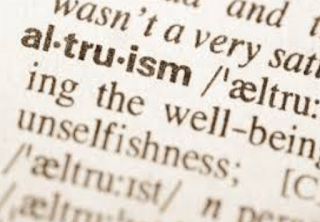While altruism is often understood as rooted in tenderness, scientific research suggests otherwise. Rather, altruism may have evolved with the desire to condemn and even punish those who act solely in their own interests. We can be motivated to do good, to avoid being rejected by our community.
The function of altruism
These impulses to act for the good may have helped our early ancestors enforce social norms, in an earlier era formal laws, contracts and courts have forced cooperation.
A few years ago, an international group of researchers led by anthropologist Joseph Henrich from Emory University in Atlanta, tested this theory. They created three experimental games and they played with people who lived in Africa, South America, New Guinea, the South Pacific and the US Midwest.
In these games, players were anonymous to each other. All received real money (or "game") to operate:
* The dictator Thurs. The player to decide how much your participation to give the player B. Player B must accept any amount offered. If player A is stingy, no fault.
* The ultimatum game. Player A decides how much to share with the player B. Player B, before hearing the amount, deciding which offer is acceptable. If B rejects A's offer, both players receive nothing.
* The third game of repression. Player A decides how much to share with the player B. Player C is given an independent participation. If C feels was too stingy A, C can be punished by reducing the benefits of, but C should pay part of their participation for the privilege.
The interest dictates that all players must have all the money they receive, because it is a time that the anonymous meeting and reputation does not matter.
In fact, the interest does not govern the results. Few have acted purely selfish. Overall, there was an almost universal to act altruistically and share the trend of play.
Player A is usually offered something that the player B and frequently gave media. In the third game of the punishment, Player C was generally willing to sacrifice some money to punish selfishness. A player, when you know that the punishment was possible, tended to be more generous.
Since Player A has more stingy, most players have chosen to punish him if they were the target of selfishness A player or just a spectator. Local customs affect the amount of trade and the punishment threshold.
Human values and standards
The studies do not show whether it was induced by a desire for revenge or feelings of envy or competition. In any case, people can be more generous when they expect to be punished by selfishness which is outside the cultural norm or when behaving fairly is a high value of the community.
What this means for Eleanor Roosevelt's desire for a tender of universal human consciousness? Human beings with a greater capacity for altruism may have had a survival advantage in primitive societies.
But it was the people who were good with a spear and had a talent for looking for food or agriculture. In evolutionary terms, being the time both strong and selfless seems to be the winning combination.
If it is pure altruism, Heinrich study provides no evidence. But it supports the idea that even if we are being "unselfish", we serve our own interests.
Mrs. Roosevelt could argue that society becomes more bearable when people feel good to be kind and generous, rather than the harsh and unforgiving heart. And if I could look around today, she would probably not think of tenderness flourished worldwide since his death in 1962.
But it can be encouraged to know about research showing "altruism" or consciousness as a natural emergent property of human societies. We humans seem to have the ability to play clean, though we sometimes fear of punishment that can help us do that.
Mrs. Roosevelt could argue that society becomes more bearable when people feel good to be kind and generous, rather than the harsh and unforgiving heart. And if I could look around today, she would probably not think of tenderness flourished worldwide since his death in 1962.
But it can be encouraged to know about research showing "altruism" or consciousness as a natural emergent property of human societies. We humans seem to have the ability to play clean, though we sometimes fear of punishment that can help us do that.
By: Michael Craig Miller,M.D.













0 komentar:
Post a Comment
"Thank you for visiting my blog, please leave a comment in the space provided."